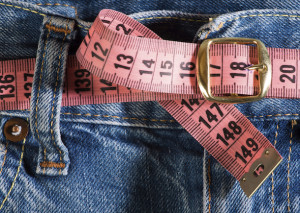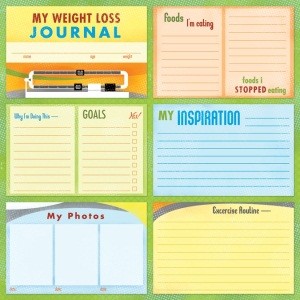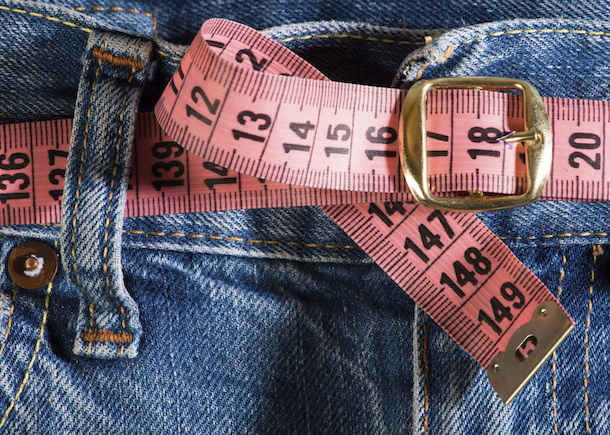 Feedback is vital on any health and fitness journey, and, according to 50 years of psychology research, feedback is one of the most important components of long-term motivation. A performance result, such as the number you see when you step on the scale, is a kind of feedback—it provides an objective way of seeing how you’re doing, let’s you know if you are headed in the right direction, and can help to keep you motivated.
Feedback is vital on any health and fitness journey, and, according to 50 years of psychology research, feedback is one of the most important components of long-term motivation. A performance result, such as the number you see when you step on the scale, is a kind of feedback—it provides an objective way of seeing how you’re doing, let’s you know if you are headed in the right direction, and can help to keep you motivated.
Scale Got You Down?
However, even performance metrics that seem to provide the right kind of feedback for a specific goal can fail at giving an accurate full picture of results. The best performance metrics are relevant, reliable, and track-able. That scale on your bathroom floor is a tool that was designed to guess how many atoms you have. That’s all it does. It uses a spring or a coil of wire to estimate how many atoms make up your body based on how the Earth’s gravity affects that spring when you stand on it. It can swing 8 pounds in a day, remain completely fixed for months, and—most detrimental of all—it can leave you feeling frustrated when you’ve been doing everything right to get to your real goals!
But first it is important to ask yourself what are your “real goals?” I start my patient assessments by asking a simple, but often-hard question: “What do you want?” Not “What have you been told to want,” but “What do you want from your body, your time, your effort, and your focus?” The answers to this question vary. I’ve heard everything from “I want to play with my kids” and “I want to feel better and be healthier,” to “I want to look better naked.” Once you determine what your real goals are, you may need more then just the number on your bathroom scale to measure how close you are moving in the right direction to your real goals.
A scale doesn’t measure how strong you’re getting, how much better you feel, or if you can play hide-and-seek for hours. The number of pounds we have in our body usually has nothing to do with what we actually want, making your weight on that scale a less accurate performance indicator.
Here are some better ones:
 Take pictures
Take pictures
If what you want is to look better in a swimsuit, in a pair of jeans, or even naked, take before and after pictures. The number on your scale can remain stubbornly fixed due to water retention and hormone fluctuations—even as your clothes begin to hang better on your body and you start to look slimmer in the mirror. Rather than hopping on the scale every Monday, whip out a camera phone and take a selfie instead.
 Use a tape measure
Use a tape measure
I’ve had patients tell me after consistently losing weight for a year “I need a new plan. I stopped losing weight, even though my waist is getting smaller.” If your waist or hip measurements are going down (the circumference at the widest points), you are losing fat—which is usually someone’s actual goal, and possibly replacing it with muscle weight. Just keep doing what you’re doing and don’t rely on only what your results on your scale are. In particular if you are working out consistently your body composition can change drastically without your scale showing much improvement.
 Use How Your Clothes Fit
Use How Your Clothes Fit
Do you find that you are using a tighter notch in your belt? or maybe those pants that you could not even get past your hips you are able to button them up. There is no greater motivator then discovering that you now fit into all those clothes you moved to the back of your closet as “someday I will fit into these”. In fact try them on often. Even if you don’t quite fit into them yet they can tell you how close you are getting to being able to slip them on.
 Play with your kids (or grandkids!)
Play with your kids (or grandkids!)
If your goal is to be able to play with your little ones without getting tired, set a time to play with them every week. If it’s getting easier to do week after week, then you’re making progress! You can even keep track of how easy it is by writing yourself a note like, “Played with grand kids today. Was a 7 on a scale of 10, with 10 being the most energy!”
 Keep track of what you’re doing
Keep track of what you’re doing
When it comes to the human body, only bad things happen quickly (like injuries). Good things take time, and always more time than we think they should. Keeping track of healthy things you are doing, like eating colorful vegetables at every meal and walking daily, is the best way to see if you’re doing what you actually need to be to reach your goals. Every great athlete keeps a training log. Every pilot keeps a flight log. When you start doubting yourself, just look at all the little things you’re doing and remind yourself you’re on the right track! You just have to keep moving forward!
Give some thought to what you actually want and then figure out the best way to track your progress. Remember the most accurate performance metrics are relevant, reliable, and track-able. By using a combination of all these performance indicators will give you more reliability and certainly more motivation when it comes to tracking your progress during your journey to better health.


